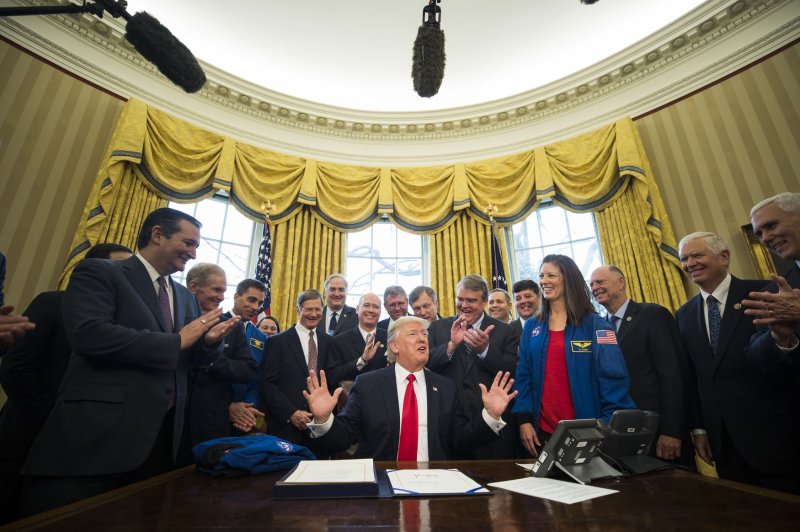U.S. President Donald Trump prepares to sign the NASA Transition Authorization Act in the Oval Office of the White House in Washington, D.C., on Tuesday, which boosts NASA's budget -- much of which will be directed toward pursuit of a mission to Mars. Pool Photo by Jim Lo Scalzo/UPI |
License Photo
March 21 (UPI) -- President Trump signed the NASA Transition Authorization Act on Tuesday, which sets policy priorities and recommends funding levels. The bill suggests a 2017 funding level of $19.5 billion for NASA.
The Senate approved the bill in February, and the legislation was passed along to the White House after the House lent its support for the unchanged bill on March 7.
Trump, flanked by Vice President Mike Pence and NASA personnel, offered brief remarks before signing the bill.
"I'm delighted to sign this bill," Trump said. "It's been a long time since a bill like this has been signed reaffirming our national commitment to the core mission of NASA, human space exploration, space science and technology."
The legislation, S.422, emphasizes human space exploration, pledging support for NASA's Space Launch System and Orion programs, which are focused on developing a new transport and exploration vehicle capable of carrying astronauts to the International Space Station, moon, Mars and beyond.
"This bill reiterates the importance of maintaining NASA's continuity of purpose to ensure America remains a leader in space exploration," Congressman Lamar Smith, R-Texas, chairman of the Committee on Science, Space and Technology, said in a statement earlier this month. "It also directs NASA to create a roadmap for human exploration and guides the future path of exploration for decades to come."
The bill asks for Congress to support the continued operation of the International Space Station through at least 2024 and perhaps 2028. The NASA Transition Authorization Act also pledges support for James Webb Space Telescope, set to launch in 2018.
Though the legislation enjoyed bipartisan support in both the House and Senate, some Democrats criticized the legislation's silence on NASA's earth science missions. NASA played a major role in climate science research and is responsible for launching satellites used to study Earth.
The bill also questions the cost benefit analysis of NASA's Asteroid Redirect Mission, a plan to identify, capture and relocate an asteroid. Congress wants NASA to consider alternative ways to develop and test technologies useful to future Mars missions.















